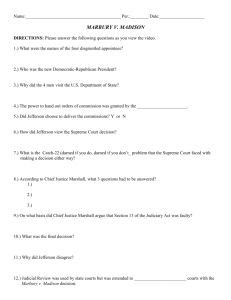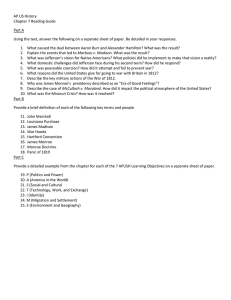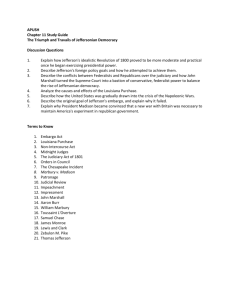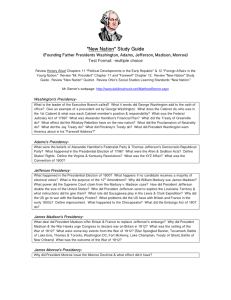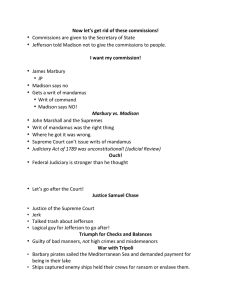1301.Topic Eight.doc
advertisement
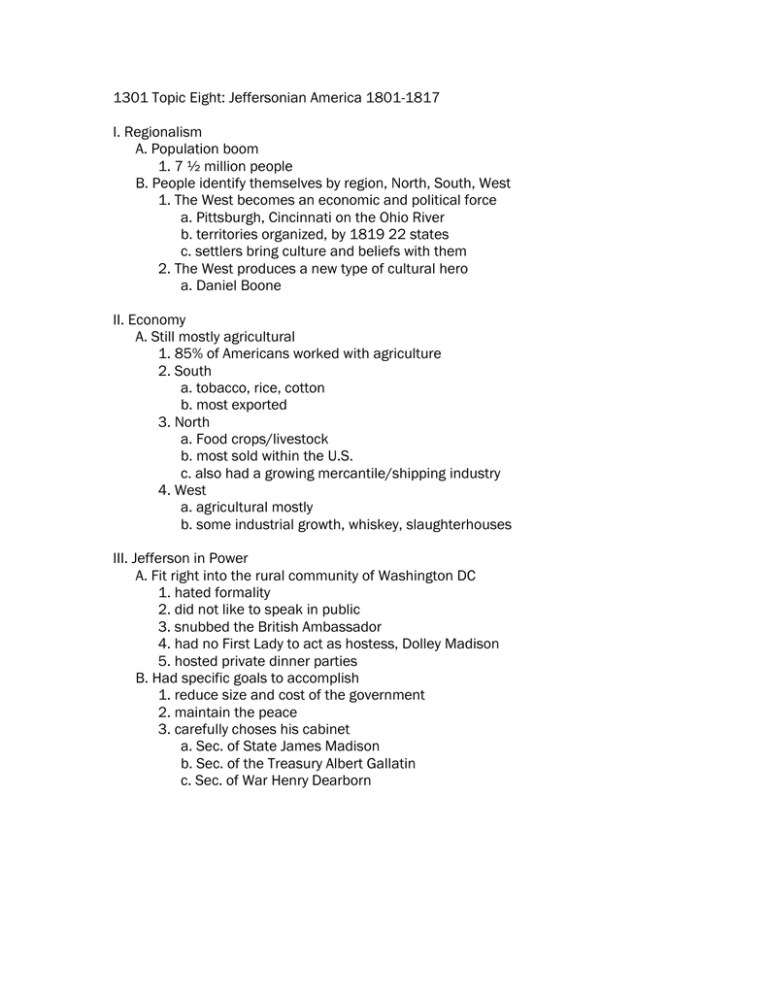
1301 Topic Eight: Jeffersonian America 1801-1817 I. Regionalism A. Population boom 1. 7 ½ million people B. People identify themselves by region, North, South, West 1. The West becomes an economic and political force a. Pittsburgh, Cincinnati on the Ohio River b. territories organized, by 1819 22 states c. settlers bring culture and beliefs with them 2. The West produces a new type of cultural hero a. Daniel Boone II. Economy A. Still mostly agricultural 1. 85% of Americans worked with agriculture 2. South a. tobacco, rice, cotton b. most exported 3. North a. Food crops/livestock b. most sold within the U.S. c. also had a growing mercantile/shipping industry 4. West a. agricultural mostly b. some industrial growth, whiskey, slaughterhouses III. Jefferson in Power A. Fit right into the rural community of Washington DC 1. hated formality 2. did not like to speak in public 3. snubbed the British Ambassador 4. had no First Lady to act as hostess, Dolley Madison 5. hosted private dinner parties B. Had specific goals to accomplish 1. reduce size and cost of the government 2. maintain the peace 3. carefully choses his cabinet a. Sec. of State James Madison b. Sec. of the Treasury Albert Gallatin c. Sec. of War Henry Dearborn C. Economic policy with Gallatin 1. repeal all direct taxes a. revenue would come from tariffs 2. budget cuts a. close several embassies b. reduce size of the army to 3000 *could inhibit civil liberties c. reduce size of the navy * inhibit trade D. Louisiana Purchase 1. Jefferson wanted to buy New Orleans from Spain a. sent delegation to Madrid b. went on to Paris after ownership transferred c. Haitian Revolt convinces Napoleon to sell d. offers all of Louisiana, will double the size of the US e. Jefferson has to “bend” the constitution 2. Lewis and Clark Expedition a. left St. Louis May 1804 b. arrived at the Pacific November 1805 E. War with the Judges 1. Jefferson thought federal judges had too much power a. Judiciary Act of 1802 repeals Act of 1801 b. was a clear violation of the constitution 2. Marbury vs. Madison 1803 a. presided over by Chief Justice John Marshall b. establishes power of judicial review 3. Impeachment of John Pickering 1803 a. federal district court judge in New Hampshire b. was insane and probably an alcoholic c. BUT committed no high crimes nor misdemeanors d. was impeached (the first federal official to be impeached) 4. Samuel Chase a. Supreme Court justice b. outspoken Federalist c. was acquitted by the Senate 1805 d. test case for impeachment of John Marshall e. ensures that judges will not be charged because of their rulings F. Trial of Aaron Burr 1. Only Vice-President (until recently) to shoot someone a. killed Alexander Hamilton in a duel b. avoided trial because he never went back to NY/NJ 2. Not on the ticket when Jefferson re-elected in 1804 a. went west, where he tried various schemes b. in 1808 put on trial for treason c. John Marshall demanded strict evidence d. Burr is acquitted, but exiled to Europe G. Foreign Policy 1. Europe at war with Napoleon a. U.S. conducted “broken voyages” 2. Britain issued “Orders in Council” a. deny U.S. neutrality b. impressment of U.S. sailors 3. Napoleon issued “Continental System” a. both were “paper blockades” 4. The Leopard Incident a. public called for a war against Great Britain b. Jefferson refused, U.S. unprepared for war 5. To forestall war, Embargo Act is passed a. keep all ships at home, no international trade b. wildly unpopular c. Jefferson must send troops to quell protests d. ships who violate the act are seized e. act is repealed just before Madison takes office IV. James Madison, fourth president of the U.S. A. Architect of the Constitution 1. was a quiet, unassuming man 2. greatly aided by the popularity of his wife, Dolley 3. will face the same foreign policy problems as Jefferson B. Non-Intercourse Act 1. no trade with Britain or France 2. could change if they altered their view on neutral commerce a. David Erskine b. Macon’s Bill #2 C. War Hawks in the West 1. western politicians want war against the British a. felt they were behind native resistance in the west b. Battle of Tippecanoe, William Henry Harrison c. also had an eye on Canada d. pressure Madison into declaring war in June 1812 e. British puzzled, had just suspended Orders in Council D. The strange War of 1812 1. The British mostly ignored the Americans at first a. had to finish war with Napoleon 2. Madison wins re-election in 1812 3. Americans tried to invade Canada a. do not have the resources b. New England refuses to take part c. cannot raise funds, Bank of U.S. closed in 1811 d. invasion fails 4. By 1814, Napoleon defeated, British focus on American war a. three invasion points b. first, through Canada, but not successful c. second, land troops in the Chesapeake * succeed in burning down Washington DC * fail to take Baltimore, so troops evacuated * Star Spangled Banner written d. third, invasion of New Orleans * war had already ended * huge American victory * Andrew Jackson a national hero 5. Treaty of Ghent ended the war a. hollow victory, no terms agreed upon b. Americans celebrate however c. nationalism flourishes E. Election of 1816 1. James Madison elected 2. third president from Jefferson’s party 3. Federalist only survive in the judiciary
